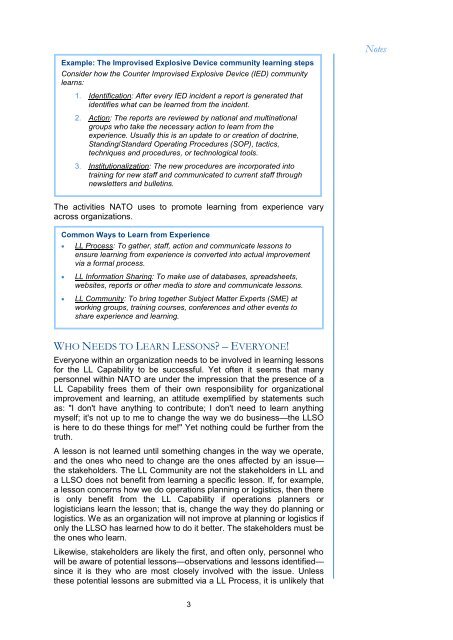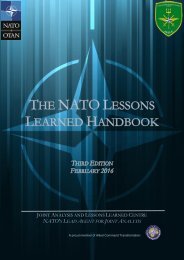JOINT ANALYSIS LESSONS LEARNED CENTRE NATO'S LEAD AGENT JOINT ANALYSIS
1ViofYb
1ViofYb
You also want an ePaper? Increase the reach of your titles
YUMPU automatically turns print PDFs into web optimized ePapers that Google loves.
Notes<br />
Example: The Improvised Explosive Device community learning steps<br />
Consider how the Counter Improvised Explosive Device (IED) community<br />
learns:<br />
1. Identification: After every IED incident a report is generated that<br />
identifies what can be learned from the incident.<br />
2. Action: The reports are reviewed by national and multinational<br />
groups who take the necessary action to learn from the<br />
experience. Usually this is an update to or creation of doctrine,<br />
Standing/Standard Operating Procedures (SOP), tactics,<br />
techniques and procedures, or technological tools.<br />
3. Institutionalization: The new procedures are incorporated into<br />
training for new staff and communicated to current staff through<br />
newsletters and bulletins.<br />
The activities NATO uses to promote learning from experience vary<br />
across organizations.<br />
Common Ways to Learn from Experience<br />
<br />
LL Process: To gather, staff, action and communicate lessons to<br />
ensure learning from experience is converted into actual improvement<br />
via a formal process.<br />
<br />
<br />
LL Information Sharing: To make use of databases, spreadsheets,<br />
websites, reports or other media to store and communicate lessons.<br />
LL Community: To bring together Subject Matter Experts (SME) at<br />
working groups, training courses, conferences and other events to<br />
share experience and learning.<br />
WHO NEEDS TO LEARN <strong>LESSONS</strong>? – EVERYONE!<br />
Everyone within an organization needs to be involved in learning lessons<br />
for the LL Capability to be successful. Yet often it seems that many<br />
personnel within NATO are under the impression that the presence of a<br />
LL Capability frees them of their own responsibility for organizational<br />
improvement and learning, an attitude exemplified by statements such<br />
as: "I don't have anything to contribute; I don't need to learn anything<br />
myself; it's not up to me to change the way we do business—the LLSO<br />
is here to do these things for me!" Yet nothing could be further from the<br />
truth.<br />
A lesson is not learned until something changes in the way we operate,<br />
and the ones who need to change are the ones affected by an issue—<br />
the stakeholders. The LL Community are not the stakeholders in LL and<br />
a LLSO does not benefit from learning a specific lesson. If, for example,<br />
a lesson concerns how we do operations planning or logistics, then there<br />
is only benefit from the LL Capability if operations planners or<br />
logisticians learn the lesson; that is, change the way they do planning or<br />
logistics. We as an organization will not improve at planning or logistics if<br />
only the LLSO has learned how to do it better. The stakeholders must be<br />
the ones who learn.<br />
Likewise, stakeholders are likely the first, and often only, personnel who<br />
will be aware of potential lessons—observations and lessons identified—<br />
since it is they who are most closely involved with the issue. Unless<br />
these potential lessons are submitted via a LL Process, it is unlikely that<br />
3



